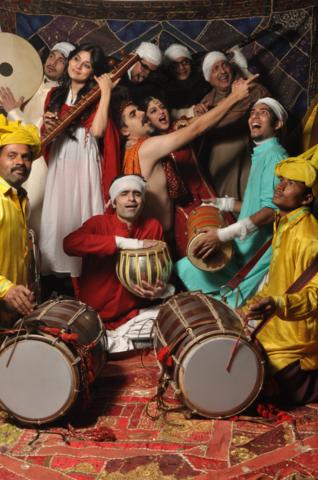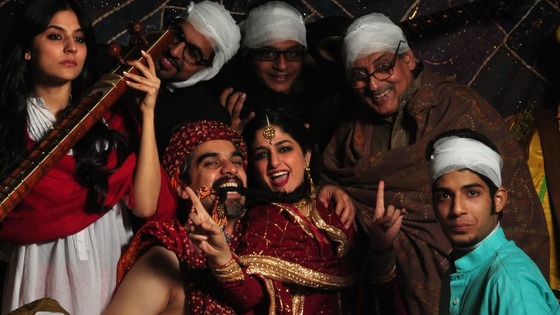Being an ardent theatre fan, The Taming of the Shrew was a must see for me as it was being staged in Urdu at the Shakespeare’s Globe. I booked my ticket right away, even though my final exam was coinciding with the date of the play. I was excited due to a couple of reasons: Pakistan was going to be one of 37 countries performing a Shakespeare play in their own language and interpretation. The concept behind it was to commemorate Olympics that were being held at London. In addition to this, the play was one of its kind as it had an array of new comers as well as experienced actors such as Nadia Jamil and Salman Shahid. Furthermore, the interpretation of the play had been conducted via Skype by Maryam Pasha, Zaibun Pasha and Aamna who have degrees in English Literature and Creative Writing and are also fluent in Urdu, and one would be tempted to see how they had done justice to a classic.
It was a hot sunny London day with a cool breeze and the much anticipated day had finally arrived. Many were dressed in the traditional Pakistani shalwar kameez. Having settled in my seat, I looked around to survey the audience, expecting mostly Pakistanis. I was surely incorrect. Numerous foreigners were in the audience about to sit through a three hour long play in a language they didn’t understand. Theatre surely does eliminate boundaries.
The play commenced with a short welcome speech by Salman Shahid followed by the Pakistani national anthem. Along with the Pakistani’s who stood up for their national anthem, many foreigners joined showing their respect for our country. Standing for your national anthem with people from all around the world in Shakespeare’s globe was a moment to be proud of!
The play revolves around the story of Mian Bashir’s (Salman Shahid) daughters; the role of the elder daughter is performed by the charismatic Nadia Jamil (originally Katharine) and Karen David plays the role of the younger sister, Bina. Kiran (Nadia Jamil’s character) is a rebellious, educated, slightly ill-tempered yet shrew lady, whereas her sister appears to be the complete opposite. There are many suitors lined up for Bina but the traditional father refuses to get her married until the elder daughter is married. One of the suitors for Bina, Hasnat compels his friend, Rustum (originally Petruchio played by Omar Rana) to marry the elder daughter so that he can have his chance with Bina. Rustum, the Pathan from Mianwali agrees as he needs a wife from a wealthy family. The scene where Kiran and Rustum meet for the first time is one of the finest moments in the play. There is war of words accompanied with perfect visuals, such as slapping across the face, between the two. If Kiran is rebellious, Rustum is stubborn. Kiran forcefully gets married to Rustum and Rustum teaches her to be obedient. Bina chooses her future husband and gets married. Hasnat, rejected by Bina, gets married to a widow. The play ends with Rustum and Kiran happily in love and a message from Kiran stating that even an educated wife should obey her husband and only then will he respect her. They are to be each other’s partners rather than master and slave.
The play incorporated almost every theatrical ingredient at its finest. The costumes of each character from Rustum’s bright purple and orange shalwar kameez, to Kiran’s yellow pishwas to her red wedding dress, to the servant’s waistcoat and cap were impeccable. They not only represent Pakistani tradition as a whole, but also the diversity of cultures witnessed within Pakistan.
Another treat for music lovers was that the performances were supported by live music by Valerie Kaul and the Mekaal Hasan Band. Traditional instruments from the Pakistani culture were used such as the flute, sitar, tabla, harmonic and so forth. Different scenes within the play were supported with different instruments. The music kept both the audience and the play alive with moments like the band playing instrumental Balay Balay and the audience joining in with their claps, or the astonishing moment where Nadia Jamil sings Aaj janay ki zid na karo or the romantic scene between Nadia and Omer Rana where the Pakistani song Main tenu pyar kartay haan is played by the band.
The play is the perfect portrayal of emotions through strong visuals. You have the classical irony humor throughout for instance when Bina’s suitors are introduced to the father, romance when Kiran is crying and Rustum comes to comfort her, anger when the sisters batter each other. Actors used the space of the stage flawlessly with numerous characters entering through the audience, keeping the audience involved.
Upbeat dance routines were a part and parcel of the play as well, one was at the beginning and one at the end, making the audience applause frenetically each time. Near the end, all actors take part in the customary Ludi as part of the play. A brief classical dance by Nadia Jamil created a serene and soothing atmosphere.
After the play had ended, I asked a few people from the audiences what they had thought of the play, most of them were unfamiliar with the language Urdu. Two gentlemen said that they hardly knew a word of Urdu, but they enjoyed it a lot because of the constant strong actions that kept the audience engaged and enthralled. Another said that the acting was remarkable especially the switch between Kazim (Umer Naru) and Mir (Ahmed Ali). “They should get all this praise, they deserve it,” said a pleased lady.
I had tried to figure out the drawbacks of the play before deciding to pen this write up, however I have been unsuccessful. One had to be there to witness the ten minute applause the actors received accompanied with the standing ovation. Congratulations to Nadia Jamil, Salman Shahid, Omer Rana, Osman Khalid butt, Umer Naru, Karen David, Mukarram Kaleem ,Ahmed Ali ,Maria Khan, Hamza Kamal, Daud Randle, Syed Abbas Hussain, Kaul, Mekaal Hasan, the Director, Haissam Hussain and the Artistic Producer, Susannah Harris Wilson. This is called representing one’s culture in the purest form and succeeding at it marvelously. It was truly a magical evening!






